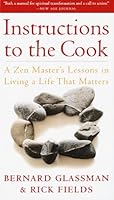
## Metadata
- Author: [[Bernard Glassman, Rick Fields]]
- Full Title: Instructions to the Cook
- Category: #books
## Highlights
- The emptiness of meditation does not denote a lack or absence of anything but is actually the state of openness that makes all things possible. It is like the space inside a cup or the space at the hub of the wheel. A full cup can’t receive anything, but an empty cup can receive all kinds of offerings. And a wheel without a hub for an axle cannot turn. ([Location 477](https://readwise.io/to_kindle?action=open&asin=B003FCVFYK&location=477))
- In Zen we have a saying that if you haven’t seen somebody for two minutes, don’t assume he or she is the same person. Maybe that person has changed, or maybe conditions have changed. The important thing is to see what I can do now. If you and I are not bound by our past conditioning, we can see things afresh. Then every moment contains a new opportunity. ([Location 519](https://readwise.io/to_kindle?action=open&asin=B003FCVFYK&location=519))
- The clarity of our vision determines the set of ingredients in front of us. Most of us—whether we think of ourselves as religious people or not—would agree that the more clearly we can see the situation we’re in, the better our plans and actions will be. But that doesn’t mean we can say, “Well, I’m not yet clear enough to see the ingredients, so I’m going to wait until I can see what they really are.” Whatever we see, that’s what we have to use. It doesn’t matter what it is as long as it’s what we see. Based on the clarity that we have right now, and based on whatever we can see, we can begin to act. After I’d been studying with my teacher, Maezumi Roshi, for about three years, he asked me to give introductory talks at local colleges. I told him that I wasn’t ready. I didn’t know enough. But he wouldn’t accept that. He said that you’ll never get to that place where you think you have enough clarity to teach—but that’s not a problem, because teaching is really learning. At the same time, we have to keep on working to improve our clarity. I don’t care if you are a Buddha. You can still improve your clarity. ([Location 563](https://readwise.io/to_kindle?action=open&asin=B003FCVFYK&location=563))
- One of the best exemplars of Beginner’s Mind is a baby learning to walk. Babies don’t read books about walking or go to walking seminars. They just stand up, take a step, and fall down. Then they do it all over again. They might get frustrated or angry when they fall, but they don’t get discouraged. They don’t say, “See, that proves that I can’t walk! I’ll never learn to walk. Walking is impossible!” ([Location 587](https://readwise.io/to_kindle?action=open&asin=B003FCVFYK&location=587))
- Attention always brings us back to the present, to the details of any situation from moment to moment. Awareness, on the other hand, refers to a perception of the whole situation. Instead of paying attention to individual details, awareness takes a wider, more global perspective. Awareness is attention expanded to 360 degrees. ([Location 853](https://readwise.io/to_kindle?action=open&asin=B003FCVFYK&location=853))
- Just because you have a little doesn’t mean you should do nothing. You can always do something. And doing something, starting something, making a gesture in some direction always enlarges the amount of time. The more you do, the more time you have. ([Location 1021](https://readwise.io/to_kindle?action=open&asin=B003FCVFYK&location=1021))
- So we need reasonable reserves in both business and life. But that, too, is part of sustainability. Too little reserve creates anxiety and insecurity. But too much can dull the edge that sharpens creativity. ([Location 1083](https://readwise.io/to_kindle?action=open&asin=B003FCVFYK&location=1083))
- Money is an absolutely necessary ingredient, but when it becomes the only driving force, when you focus exclusively on its accumulation, it can easily overpower and ruin a meal. Everything begins to taste sour. When you’re trying to help other people, though, you usually fall right into another kind of trap. You want everything to be nice. You’re always worrying about doing good. The social action meal has a tendency to become too sweet. When that happens, the Zen cook adds the missing ingredient, which is wisdom. If you want to do good but also want to have enough money to become self-sufficient, then you won’t go too far in one direction. Money becomes an important lever, valve, or touchstone in social action—social action does the same with money. Both areas work in harmony. ([Location 1117](https://readwise.io/to_kindle?action=open&asin=B003FCVFYK&location=1117))
- When we learn how to cook for ourselves, though, we find that our vision or understanding of the self grows and expands. The smell of food cooking and the warmth of the kitchen always invites people in. Even though it may seem as if we’re cooking for ourselves, we’re always cooking for everybody at the same time. This is because we are all interconnected. We are actually one body. ([Location 1150](https://readwise.io/to_kindle?action=open&asin=B003FCVFYK&location=1150))
- The pure lotus growing in muddy water is a metaphor for enlightenment. The lotus arises from all its impediments. It actually needs the impurity of the water for its nourishment. In the same way, in our own personal development, we can’t just work with what we like about ourselves. We have to work with our muddy water. We have to work with our problems and hang-ups because that’s where the action is. Very few—if any—ingredients are garbage. Whatever work someone is doing is the feast that person is offering. Usually we don’t see that because we are blinded by our own ideas of what the other person should be doing. ([Location 1425](https://readwise.io/to_kindle?action=open&asin=B003FCVFYK&location=1425))
- Many people won’t take a step until they think that they know what the right thing is. There is an expression, “Do the right thing.” But how do we know what the right thing is? We can’t know for sure. Maybe we should just say, “Do the next thing.” And if we do that—whatever it is—to the best of our ability, chances are it will turn out to be the right thing as well. ([Location 1709](https://readwise.io/to_kindle?action=open&asin=B003FCVFYK&location=1709))